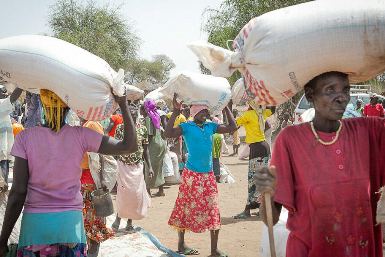UN agencies warn of food shortage, urge peace implementation in S. Sudan
February 9, 2016 (JUBA) – United Nations agencies operating in South Sudan on Monday warned of a rise in numbers of people going hungery in the country at what is traditionally harvest time as the harsh and prolonged 2016 lean season approaches.

“It is not only areas directly affected by conflict that are food insecure – some 200,000 people in Northern Bahr El Ghazal and Warrap states have also seen their access to food deteriorate, owing to factors such as price inflation and market disruptions that are tied to the conflict,” said Serge Tissot, the acting FAO Representative in South Sudan said.
“Prompt implementation of the peace agreement is absolutely critical to improving the food situation,” he added.
South Sudan, the agencies said, is facing unprecedented levels of food insecurity with 2.8 million people, about 25 percent of the country’s population – in urgent need of food assistance, and at least 40,000 people are on the brink of catastrophe.
“During the dry season, we must make a massive pre-positioning effort so that we can continue assisting people after roads become impassable once the rains come,” said the WFP Country Director, Joyce Luma.
“Rising insecurity in Greater Equatoria is hampering delivery of humanitarian assistance through major routes, setting back our efforts to prepare and respond to people who are most in need,” she added.
The number of food insecure people is expected to peak during the coming lean season – traditionally worst between April and July — when food availability is lowest.
The latest Integrated Food Security Phase Classification (IPC) analysis projects that the lean season starts early this year, and the hunger period will be longer than in previous years.
“Today’s IPC report also highlights the overall prevalence of emergency levels of malnutrition as an issue of grave concern. Malnutrition in South Sudan is attributed mostly to inadequate food consumption, along with other factors such as disease, dietary habits, as well as constrained health and nutrition service delivery,” the agencies said.
“Families have been doing everything they can to survive but they are now running out of options,” said Jonathan Veitch, UNICEF representative in South Sudan.
“Many of the areas where the needs are greatest are out of reach because of the security situation. It’s crucial that we are given unrestricted access now. If we can reach them, we can help them,” he said.
Meanwhile, FAO reportedly plans to assist 2.8 million people in producing food and protecting their livestock assets in 2016, compared to 2.4 million people reached last year. FAO emergency livelihood support includes crop kits, vegetable kits, fishing kits and livestock vaccinations of more than 5 million head of cattle.
UNICEF has set a target of treating more than 165,000 children for severe acute malnutrition (SAM) in 2016. Last year the number of children treated for SAM surpassed 144,000, which was a 53 percent increase over 2014.
WFP delivered food and nutrition assistance to some 3 million people across South Sudan in the last year, working with 87 NGO partners and using every tool at its disposal, including airdrops, river barges, cash-based transfers, local food purchases and specialised nutritious foods.
The government and opposition groups failed to form transitional government of national unity (TGoNU) in the first week of February as said by intergovernmental Authority on Development (IGAD) communique issued at the end of January.
Both parties adopted the communique, but claimed logistical constraints delayed the process.
(ST)
